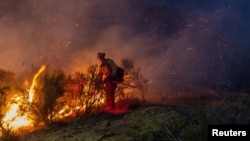A heat wave spanning from the Midwest to the Northeast is breaking records in the United States, and officials warn that the high temperatures could prove deadly.
About 80 million people from Indiana to New England are facing a heat advisory or an excessive heat warning.
Exposure to high temperatures can cause dehydration, heatstroke and heat exhaustion. It can also exacerbate cardiovascular issues and other preexisting conditions.
Officials are advising people to remain indoors and drink lots of water.
In New York, Governor Kathy Hochul activated the state’s Emergency Operations Center Tuesday in preparation for high temperatures expected to last through Friday. Cooling centers will open in New York City for the first time this year.
“This is a deadly event,” Hochul said, adding that New York beaches and public pools will open early for the Juneteenth holiday on Wednesday.
New York cities, like much of the region, are facing record temperatures for this time of year. Syracuse recently reached 34.4 degrees Celsius (93.9 degrees Fahrenheit) on Monday, breaking an all-time high for the day from 1994.
New York City, the largest city in the U.S., is also preparing for the onslaught of heat, opening cooling centers for the first time this year.
Mayor Eric Adams warned that the weather was not to be taken lightly, saying, “A heat wave can be more than just uncomfortable. It can be deadly and life threatening if you are not prepared.”
In the Midwest city of Chicago, teams of city workers visited homeless camps across the city to persuade people to seek shelter and stay out of the worst of the heat, said Brian Berg, spokesperson for the city Department of Family Services and Support.
“We provide them with not only water and food, but we’ll take them to the shelters, which are also cooling stations,” he said.
Chicago reached 36.1 degrees Celsius (97 degrees Fahrenheit) on Monday, breaking a 1957 record. The heat index, which considers temperature and humidity to measure how hot the heat feels, hit 40.6 degrees Celsius (105.1 degrees Fahrenheit) on Monday. Increased humidity intensifies the feeling of the heat.
National Weather Service meteorologist Marc Chenard noted that Detroit and Philadelphia will see record temperatures in the next few days. He said the same about cities in New Hampshire, Connecticut and Maine.
“It’s kind of early in the season to be getting this long of a duration of heat wave for the Ohio Valley and New England,” Chenard said.
A recent study found a link between climate change and heat waves, defined as abnormally hot weather extending longer than two days. According to the study, climate change has caused heat waves to travel more slowly and persist for longer periods.
Other parts of the country are battling their own weather woes. In Southern California, firefighters stepped up their efforts to contain a wildfire in the mountains north of Los Angeles. Hot, dry, windy weather could pose problems for firefighters. Wildfires in New Mexico have prompted the evacuation of a community of 7,000 people.
Meanwhile, a winter storm is forecast for the northern Rockies region, including parts of Montana and Idaho, with up to 50 centimeters (19.7 inches) of snow predicted.
And in the Gulf Coast, hurricane season is also expected to be among the most active in recent years.
Some information for this report came from The Associated Press and Reuters.



